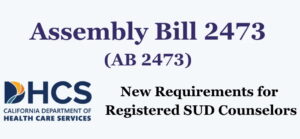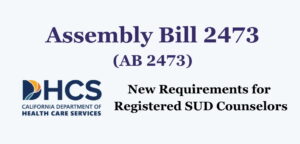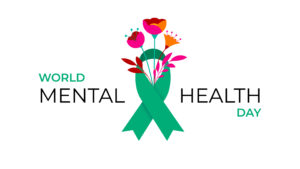New AB 2473 Education Requirements in California officially went into effect on January 1, 2026, marking a major shift for the substance use disorder (SUD) workforce.
For newly registered Substance Use Disorder (SUD) counselors, this means the timeline for completing academic foundational education has moved from a recommendation to a strict regulatory mandate.

About Assembly Bill 2473 (AB 2473)
According to the California Consortium of Addiction Programs and Professionals (CCAPP), the following reflects an accurate summary of Assembly Bill 2473:
“Assembly Bill 2473 (AB 2473), enacted in 2022, introduces updated standards for substance use disorder (SUD) counselors in California to enhance the quality of care for individuals facing substance use challenges. The bill mandates the Department of Health Care Services (DHCS) to define core competencies for both registered and certified SUD counselors, with full implementation slated for July 1, 2025.”
How to Meet the New AB 2473 Education Requirements
If you registered as an SUD counselor on or after January 1, 2026, you must complete 80 hours of academic education covering 12 specific core competencies. This requirement must be met within exactly six months of your initial registration date as part of California’s New AB 2473 Education Requirements.
The Department of Health Care Services (DHCS) established these standards to ensure a baseline of professional expertise across the state.
AB 2473 Core Competencies as Defined by DHCS:
- Clinical Knowledge: Mastery of the current DSM-5 and ASAM criteria.
- Professionalism: Strict adherence to clinical documentation, confidentiality, and professional boundaries.
- Modern Skills: Training in Electronic Health Record (EHR) systems and Medications for Addiction Treatment (MAT)
The Danger of Delay: Why the Six-Month Window Matters
Delaying your enrollment puts your professional registration at immediate risk. Because many programs are cohort-based, waiting until the final months of your window could leave you without an available seat, causing you to miss the DHCS deadline.
By embracing this course of study, you also need to embrace California’s New AB 2473 Education Requirements.
Case Study — The February Registration Timeline
- Initial Registration — February 1, 2026
- Regulatory Deadline — August 1, 2026
Enrolment Target:
You should apply to a program by March or early April to ensure processing by July.
Top Programs for New AB 2473 Education Requirements
Tarzana Treatment Centers College (TTCC) offers several flexible pathways to help you meet the new AB 2473 Education Requirements.
Here are the most reliable pathways:
- TTCC 80-Hour Core Class
This targeted, standalone program is specifically designed to cover only the 12 core competencies required by the new law. It is the most direct route for counselors who need to meet the requirement quickly.
- TTCC SUD Certification Program
For those pursuing a professional career in the field, direct enrollment into our certification program fulfills the 80-hour requirement through initial modules (SUD 101/102). This path seamlessly transitions into the full 315-hour certification journey.
- The ASCEND Program (UC San Diego)
Offered in partnership with DHCS, this is a free, self-paced online 80-hour program. It is an excellent digital option for eligible CA residents.
Secure Your Career with TTCC
As TTCC expresses on their website, “As a TTC College student we want to ensure that you are equipped with the tools to be as successful as you can be, modeling our core values of excellence, integrity, community, intersectionality, and innovation.”
Do not let the six-month clock expire. Do not ignore California’s New AB 2473 Education Requirements.
Tarzana Treatment Centers College offers a hybrid learning model that pairs clinical expertise with online flexibility. Enrolling today ensures you remain fully compliant with the latest DHCS standards.
Apply Immediately: For more information, prospective students may contact the
TTCC admissions office at TTCC@Tarzanatc.org or visit our official SUD Certification page . To begin your enrollment, applications are available through our website Apply Now














